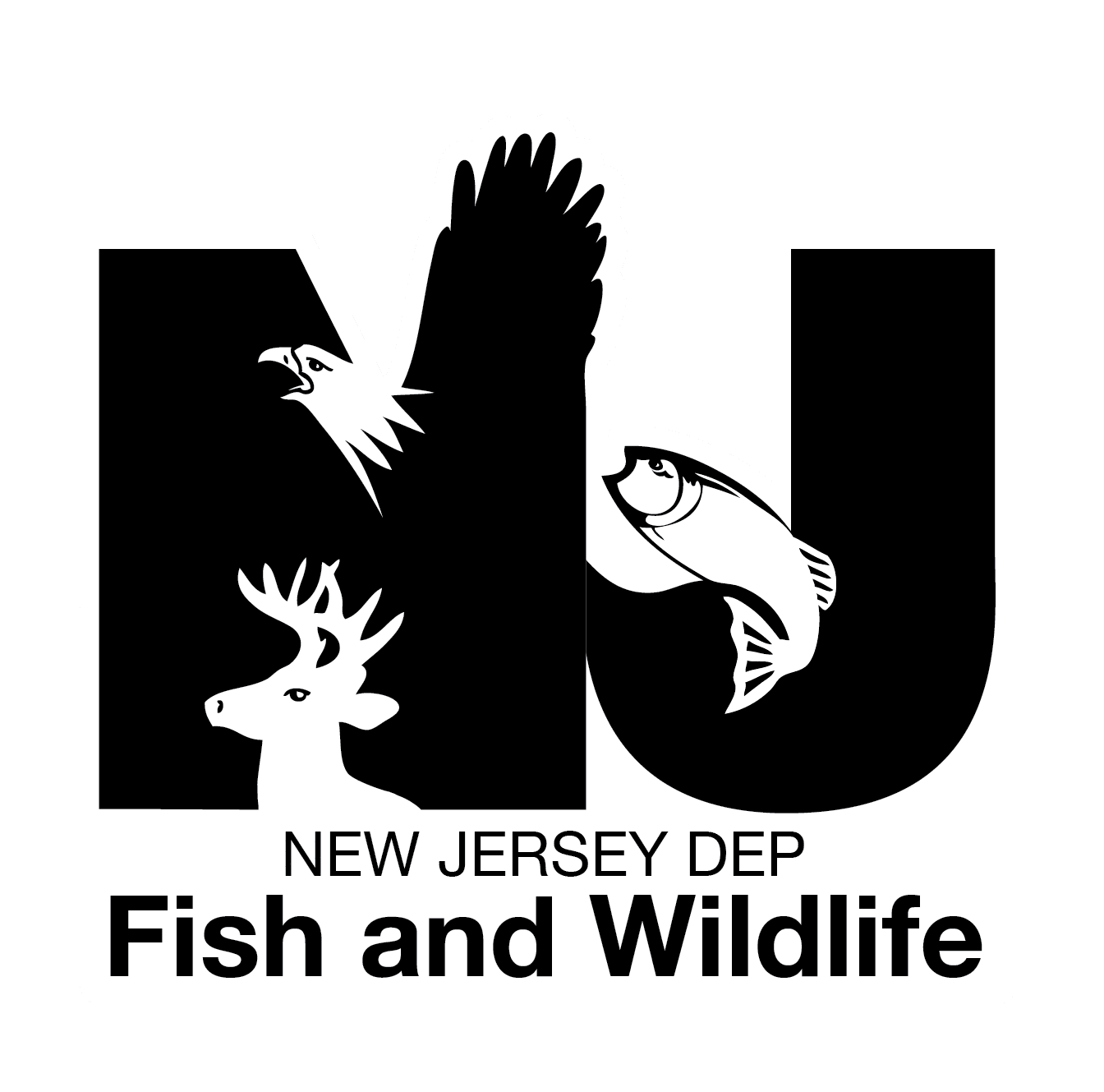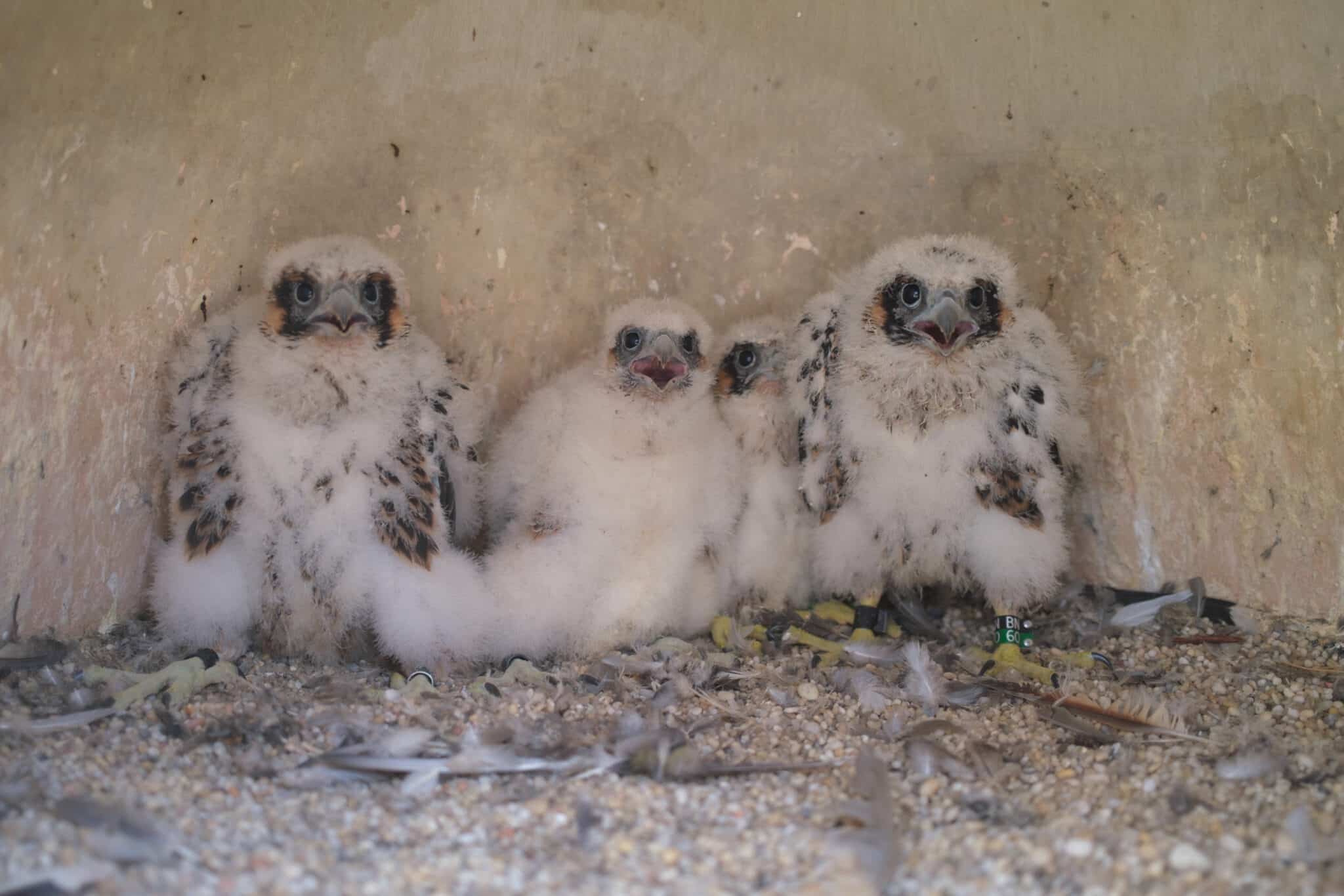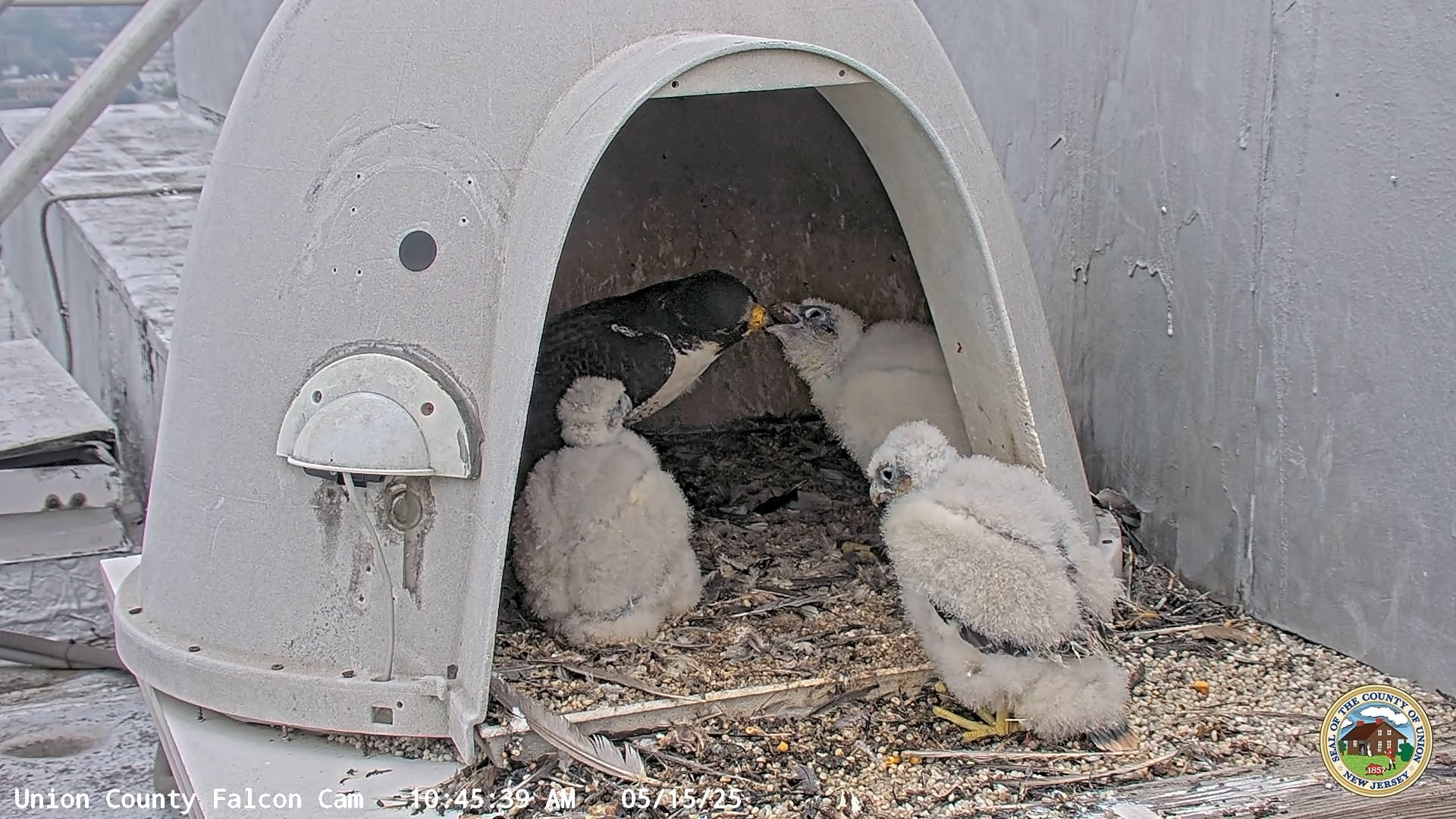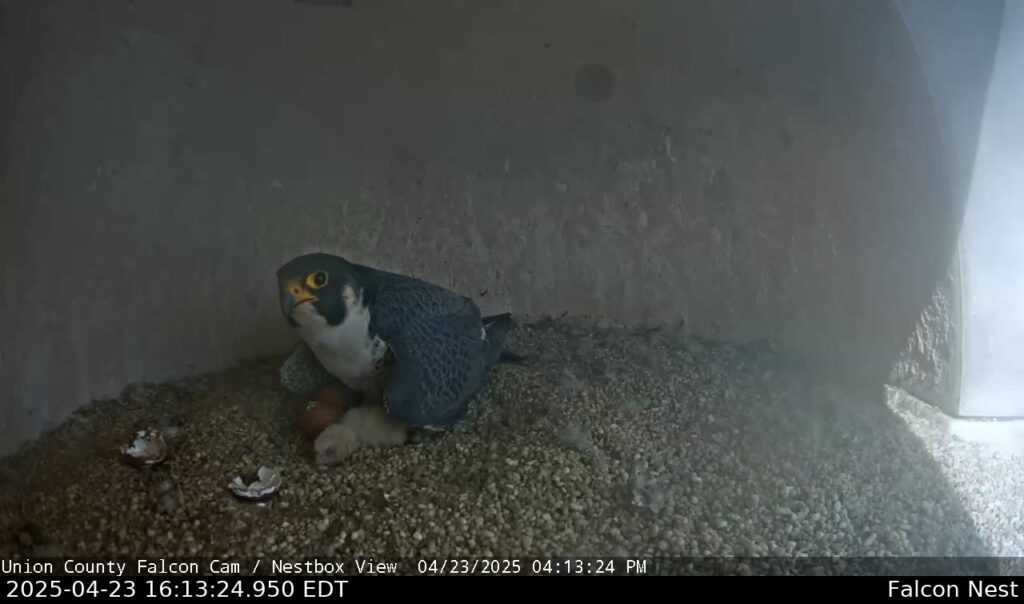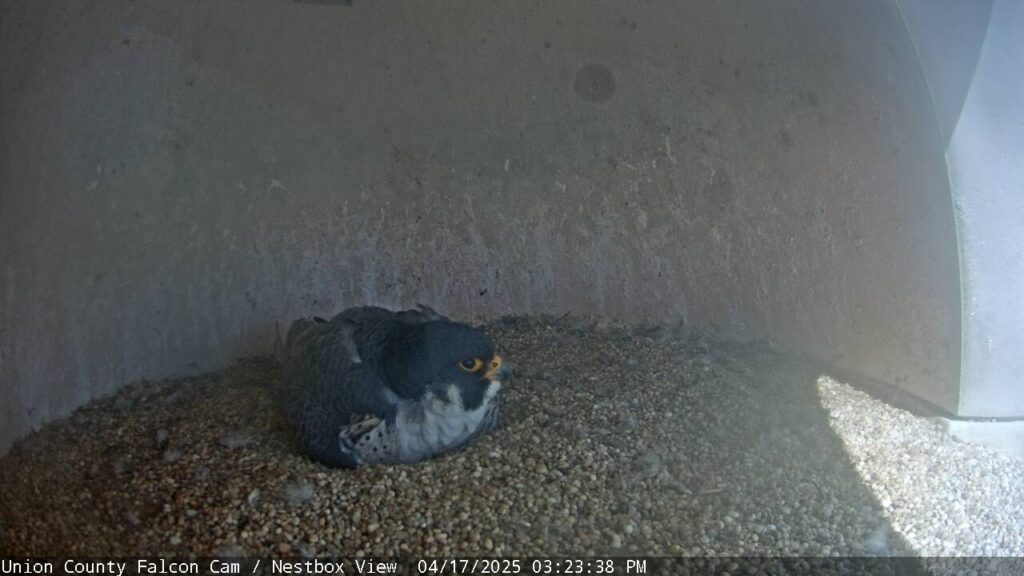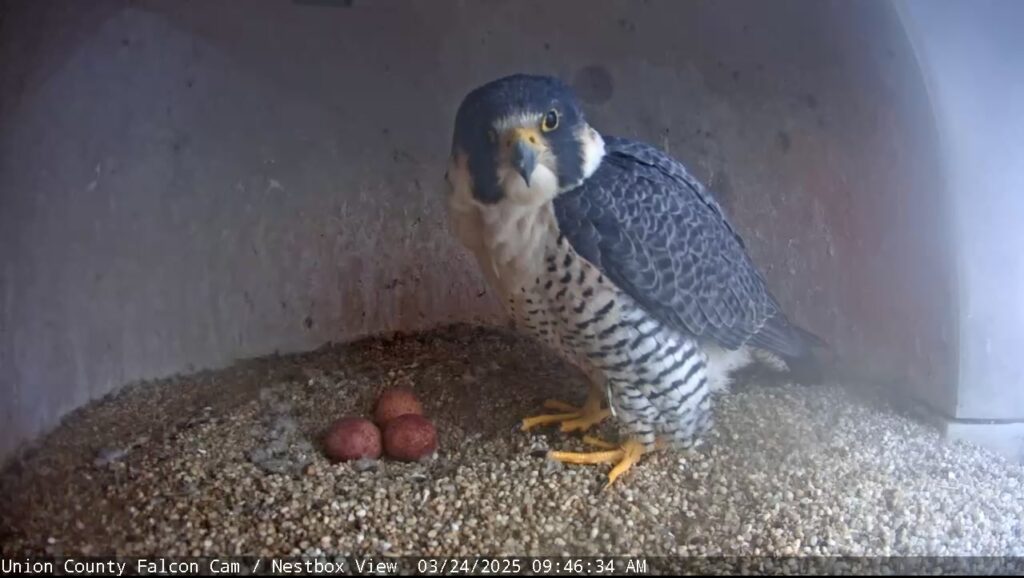Union County Falcon Cam
Elizabeth, New Jersey
Buildings and their owners/managers have played an important role in the successful recovery of Peregrine falcons in New Jersey. After a pair attempted to nest (and were unsuccessful) here in 2005, building managers took action to give these birds a second chance. Since windy conditions made nesting on the roof impossible, Union County staff, as directed by NJDEP Fish & Wildlife zoologist Kathy Clark, installed a Dogloo, also referred to as a “Peregloo” to provide a more suitable nest site. After installing the Peregloo, the nesting pair was productive! Since then the site has been occupied by falcons. In 2016, there was a turnover at the nest and the female was replaced with a young adult. Then in 2019, the current female (who is unbanded), named “Frida” replaced the previous female. The male is named “Mango.” Learn more on Union County’s website
Learn More2026 NestBox News
January 5
Happy New Year, everyone!
Who else can’t wait for warmer days, more daylight and the beginning of another nesting season here atop the Union County Courthouse in Elizabeth! I neglected to post a few updates last season that I was reminded of.. These are regarding two of the fledglings.
July 22, 2025 – BN/60 was found dead on the roof of the courthouse. As many viewers are aware, when the new female took over, sightings of the fledglings were few and far between, As mentioned previously, when a new adult takes over, then the chances of young from the previous female (Frida) surviving diminish.
August 6, 2025 – BN/61 was captured by the Port Authority of NY & NJ at JFK Airport. It was noted that she weighed 872 grams, which is normal for adult peregrine falcons. She was relocated and released at Harriman State Park which is around 50 miles to the NW later that day.
It is unfortunate to know that BN/60 did not survive, but really good news that a fledgling did survive, disperse and be re-captured in another area. This is why banding young birds is so crucial. Now time will tell when we see BN/61 again. If you ever find a band or see a banded bird, please report online via reportband.gov.
2025 NestBox News
June 24
It’s been a while since the last update. Since then all young have fledged. Thank you to Kathy Clark with NJDEP for the timeline of events that followed:
6/10 – 3 of the 4 had fledged, and BK/10 male had fledged around 6/5
6/12 – all 4 fledged, *probably including BN/62, the last-hatched
6/13 – last date any fledglings were seen on camera
There were few sightings of Frida and Mango after the young fledged.
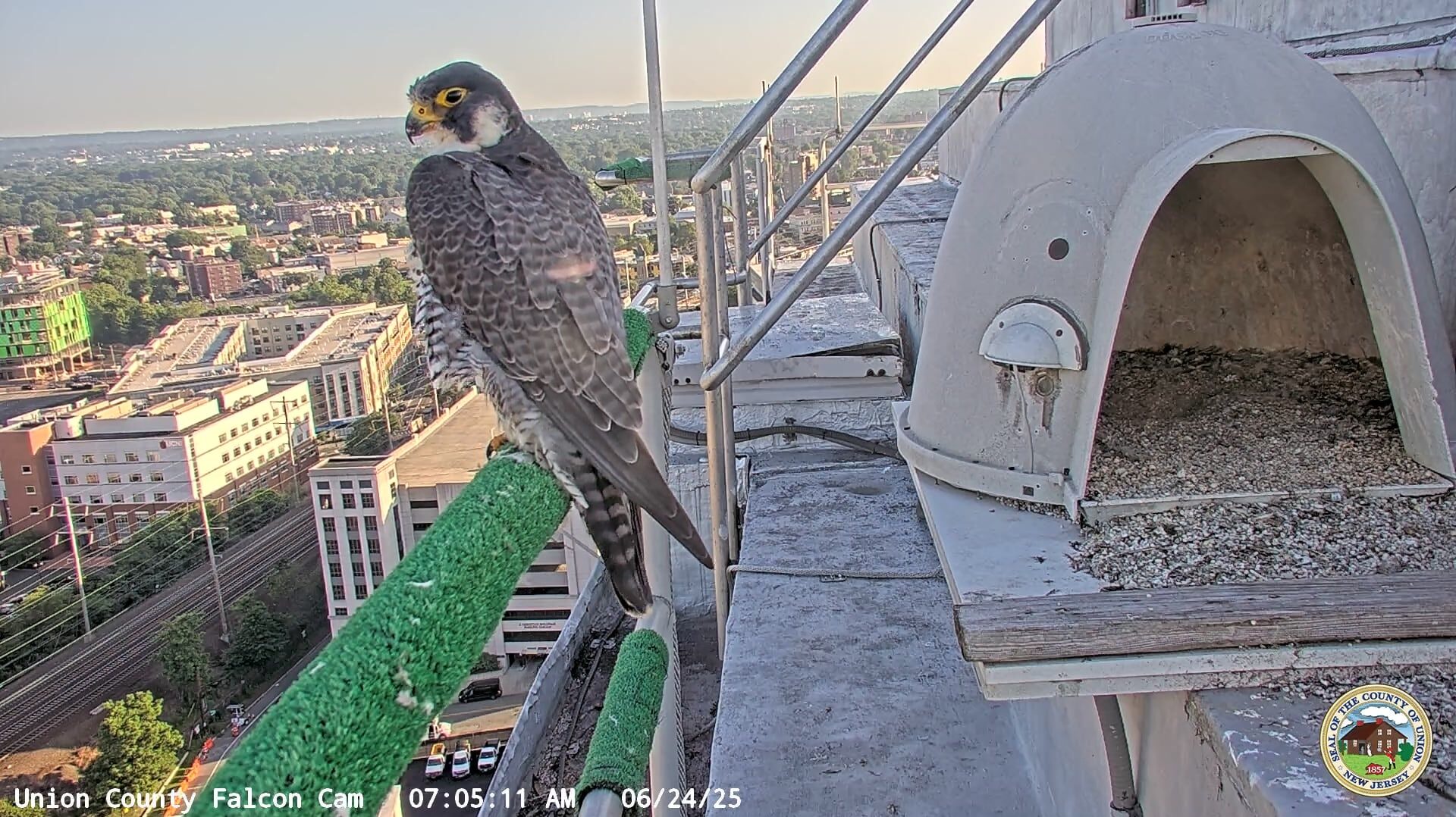
A week later, a new *banded* female was observed by viewers. She has been observed courting with Mango. This is clearly the reason why we haven’t seen the fledglings or Frida. We have not received any reports of them being found nearby. As Kathy stated in an email, “this isn’t a good sequence of events for the fledglings.” At this point it is unclear where they have gone and if they are still alive. Since they were banded, they can be traced back to this eyrie. We can only hope that they are alive and well. As we stated in a previous post, this urban nest being productive is really crucial to maintaining the falcon population in New Jersey with coastal nests being abandoned.
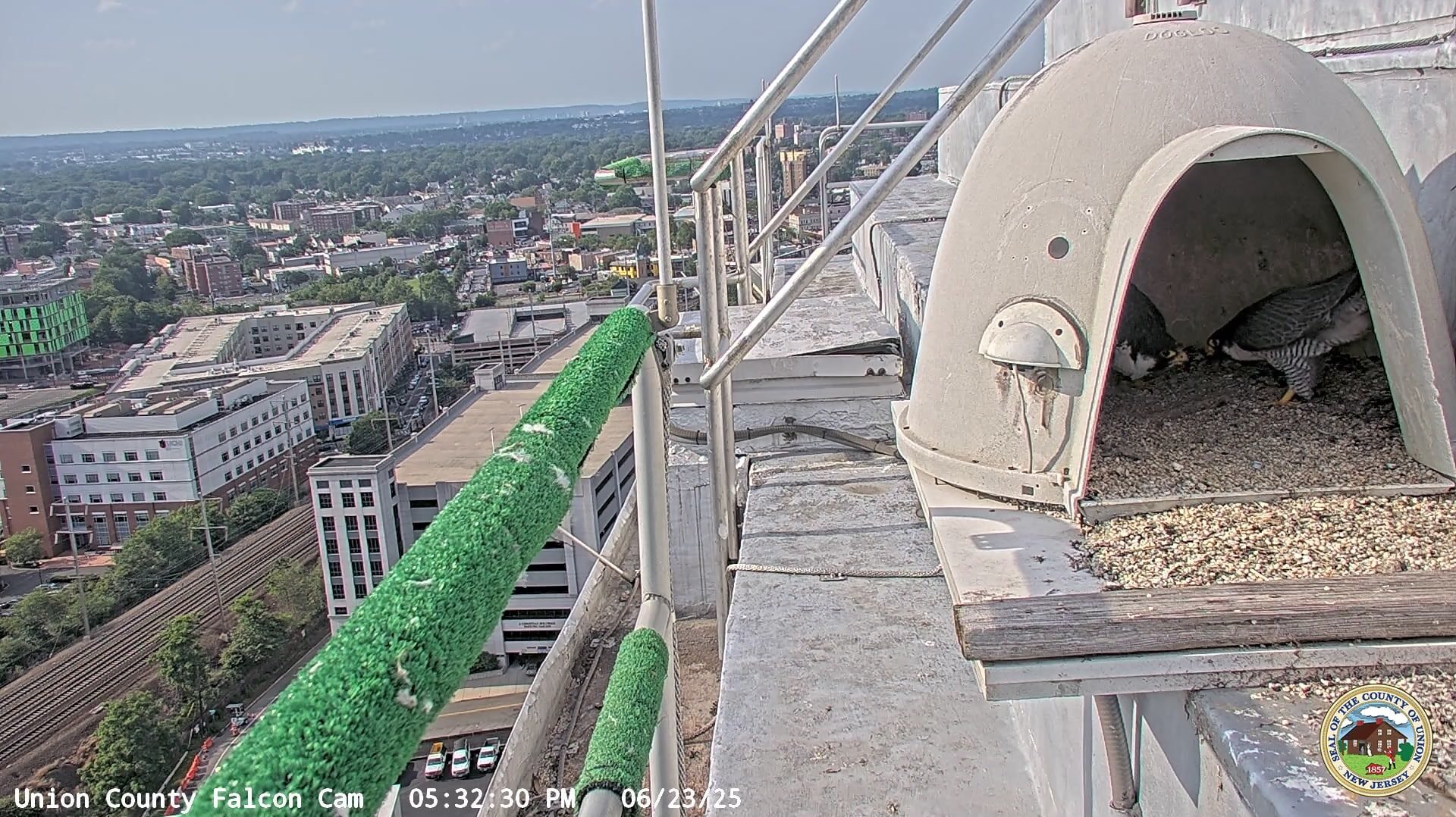
About this new female. Since she is banded, we know more about her. She only has a federal band but with the camera, Kathy was able to read the band – 1947-31215. Kathy reported that “she hatched in 2016 (unknown where) and was captured at JFK Airport and transported/banded in New Paltz, NY, where she was released (8/18/16).” She has been courting with Mango since June 21.
June 4

Unfortunately, it has been determined that the camera on the far side of the building, which is opposite of the nest, is officially out of commission and needs to be replaced. We are not sure what happened but the timing is not great. This camera allowed us to track them as they moved around the building.
We are still thankful to have the main camera, which can be panned to see along the one side of the building. This is where we have seen most young move along the roof and use some of the railings with green turf to perch.
It is only a matter of days until we see BK/10 fledge, followed by his siblings. This is a critical time for them and the most dangerous as they gain flight skills. We are thankful that Union County staff who work at the Courthouse keep an eye out for any fledglings that might end up on the ground below the building!
May 28
Last week all four of the eyases (young falcons) were banded for future tracking. There are three females and one male this year. The youngest is female, which was a good thing as it needed that extra size to compete with its siblings for food. Their bands are: BN/60, BN/61, BN/62 and the male is BK/10. You can read more about the banding of these young falcons here.
Now they’re all right around 5 weeks old and loosing their fluffy white down feathers very quickly. They are old enough to want to explore a bit more, as every day they leave their nest and explore the rooftop. This makes it much harder for us to track them with the camera. Note: the camera on the far side of the building has been offline since May 24. Union County is working to get it back online ASAP. As they explore, they will use their time outside to strengthen their wing muscles to gain strength to eventually fledge and take their first flight.
Their first flights are not too far away. The male will fledge first. Usually they fledge at around 6-7 weeks and females at around 7-8 weeks. That means the male will be taking his first flight later next week and his oldest siblings the week after. This is a crucial time for them where life gets much more dangerous. As soon as they leave the protection of their nest then they can get into trouble. Navigating our human dominated landscape is not easy. There is a lot of infrastructure for them to navigate around. Buildings with lots of glass or mirror facades can trick their perception of the landscape, especially when they’re starting to pursue prey. But first, they need to practice those essential flight skills of mastering takeoff and landing. Either way, it is a joyous time to watch them grow!
Thank you to Michael Catalini with the AP for writing up a great piece about peregrine falcons in New Jersey and the surrounding urban areas of New York. It is primarily focused on how avian influenza has affected coastal nesting falcons, many that have abandoned long standing nests that were once used to re-establish them after DDT, habitat loss and persecution devastated them.
May 15
The eyases (young falcons) are now three weeks old and their flight feathers have emerged from pin. At this age they are looking (and exploring) beyond their nest. Their eyesight has improved dramatically as they watch their parents fly above their nest and planes in the sky. They are venturing outside of their nest, as it gets more cramped and warm, especially on sunny days.
Thankfully, we have observed no signs of trichomoniasis and this is the first year in a long time (maybe forever?) that they were not treated preventative medicine. There has also been no signs of infestations of a wingless parasitic fly on the eyases that has affected coastal falcon nests. The wingless flies feed on blood in their underwing area. It is evident when we see a lot of dirt (fecal matter) and feather loss in that area of their bodies. Another really good sign that these young are all in good health. Even the little guy isn’t looking so little anymore.
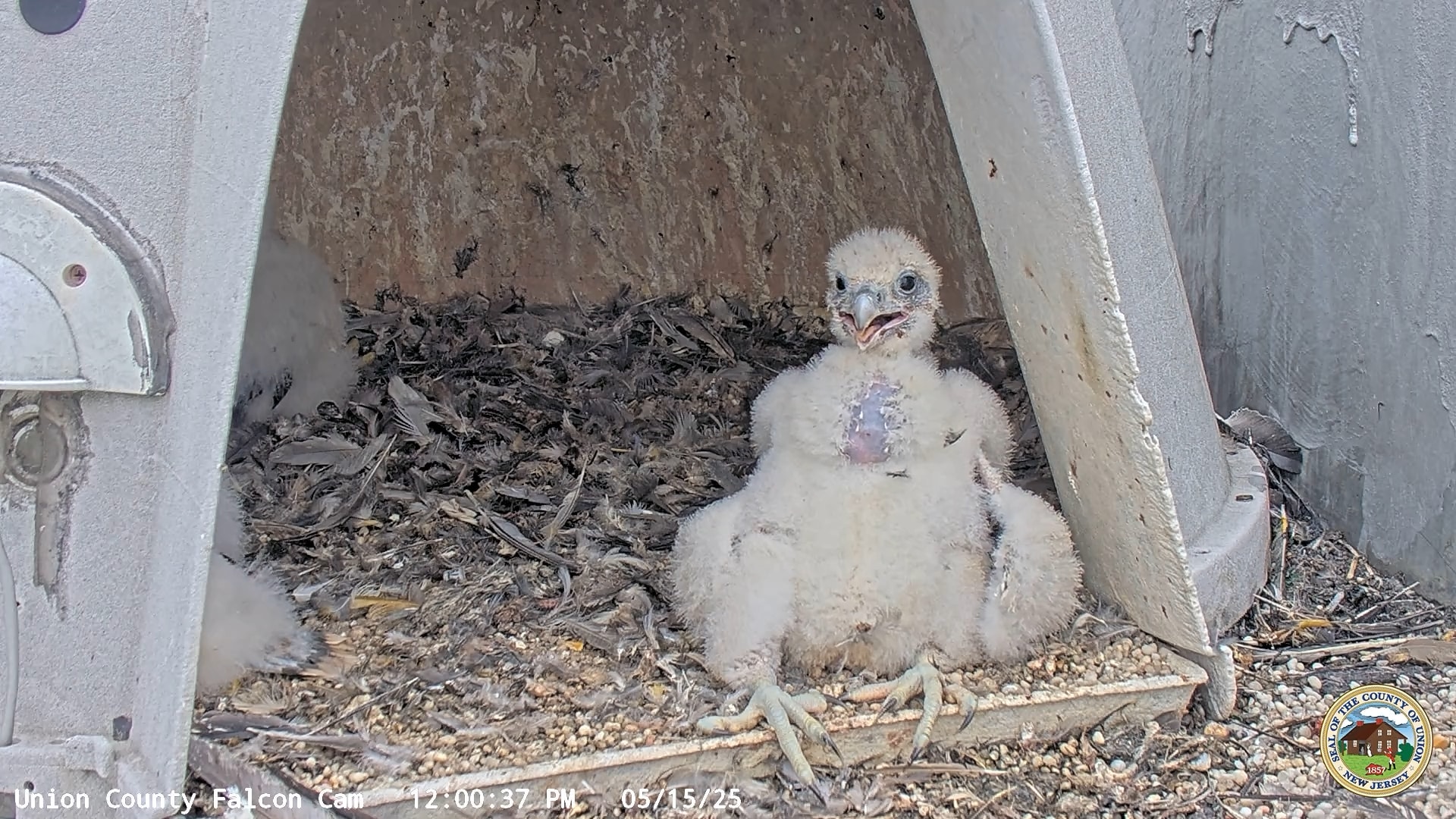
Banding is still scheduled for the morning on Monday, May 19. We’ll be sure to update everyone on social media about the banding event that day.
May 5
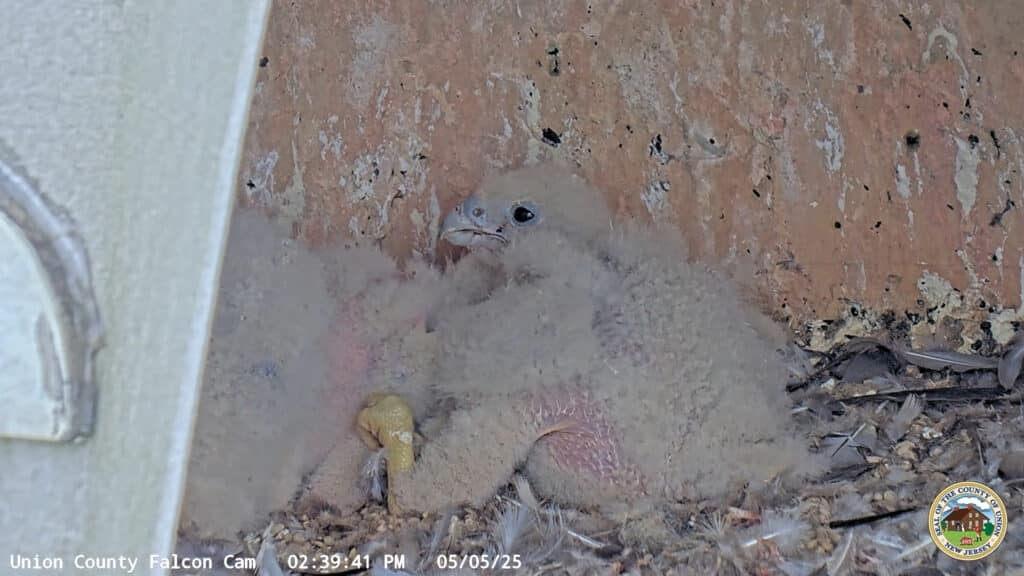
The youngest peregrine falcon nestling, who hatched on April 28, is now one week old, while its three older siblings are approaching two weeks. With each passing day, these young falcons—called eyases—are growing stronger and more alert under the watchful care of Frida and Mango.
At this stage, they are still covered in fluffy white down and rely entirely on their parents for warmth and food. They are often observed sleeping but also preening their downy feathers. Their eyesight is improving and they are starting to look around as they explore their nestbox. Feeding time is frequent, with the adults carefully tearing food into small, manageable pieces of prey. We’ve seen them bring in a variety of prey, mostly songbirds, including mourning doves, blue jays and homing pigeons. The larger the young get, the more prey they need, as they tend to eat around half their body weight each day.
Looking ahead, biologists are planning to visit the nest on May 19 to carefully band the eyases. Each band placed on a peregrine falcon chick has a unique combination of letters and numbers, kind of like a falcon’s license plate! These bands allow biologists to identify individual birds years later—sometimes from hundreds or even thousands of miles away—just by spotting them and reading the code on their band.
April 28
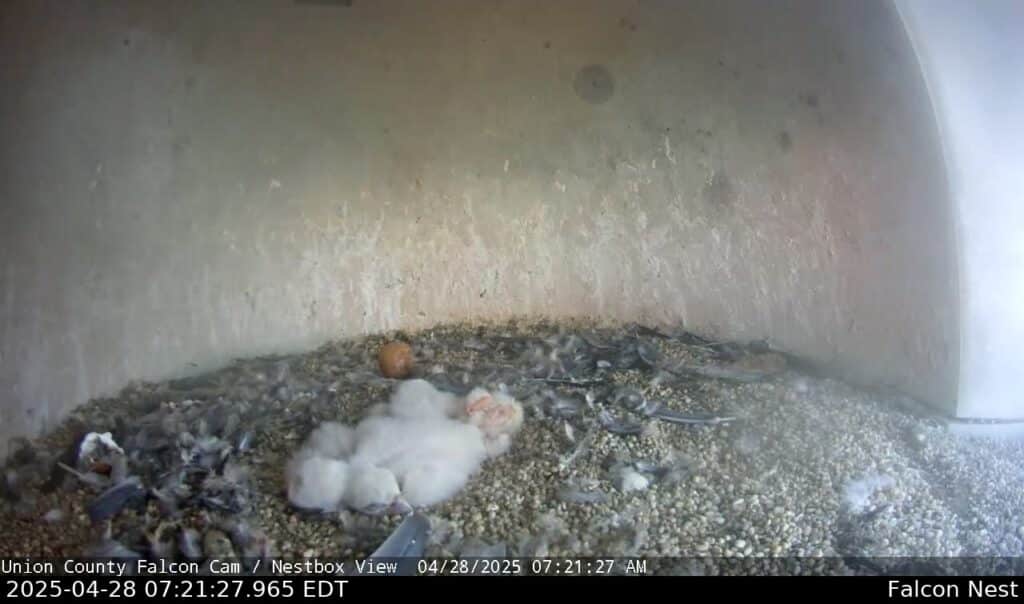 This morning viewers noted the presence of a fourth hatching! This is right on schedule for when it was laid, which was five days later than egg #3 and same time period after other eggs hatched. What a happy surprise, as I’m sure most of us were thinking that if the fourth didn’t hatch soon then it wouldn’t. We’ve seen how quick parental care shifts from incubation to brooding and feeding young. In a few days the oldest nestlings will be a week old. The adults will continue to brood them as they are not quite able to regulate their body temperatures. During the day, the adults will start to leave them unattended for short periods when temperatures are at their warmest. We are keeping an eye on them for signs of trichomoniasis, which is a pigeon borne disease that can be fatal to young PEFA if not treated.
This morning viewers noted the presence of a fourth hatching! This is right on schedule for when it was laid, which was five days later than egg #3 and same time period after other eggs hatched. What a happy surprise, as I’m sure most of us were thinking that if the fourth didn’t hatch soon then it wouldn’t. We’ve seen how quick parental care shifts from incubation to brooding and feeding young. In a few days the oldest nestlings will be a week old. The adults will continue to brood them as they are not quite able to regulate their body temperatures. During the day, the adults will start to leave them unattended for short periods when temperatures are at their warmest. We are keeping an eye on them for signs of trichomoniasis, which is a pigeon borne disease that can be fatal to young PEFA if not treated.
April 24
April 17
Frida and Mango have been keeping their clutch of four eggs warm for the past 28 days. The developing chicks are quickly absorbing the last bits of yolk and building strength to begin breaking through their shells. When they get close to hatching, we often see the adults more restless, fidgeting and paying more attention to their eggs. Once the young break through their egg shell, then we can start to hear them peeping, while taking first breaths of outside air. We have a few more days of incubation, which could put hatching to begin this weekend! 🐣
April 9
We’re now at day 20 of incubation, which began after the third egg was laid. The fourth was laid five days later. Falcons typically incubate for around 30 days, so we should start to see signs of hatching late next week. Once eggs begin to hatch, attention of adults will be directed towards their young with less going to the fourth egg. We shall see if it does hatch.
April 3
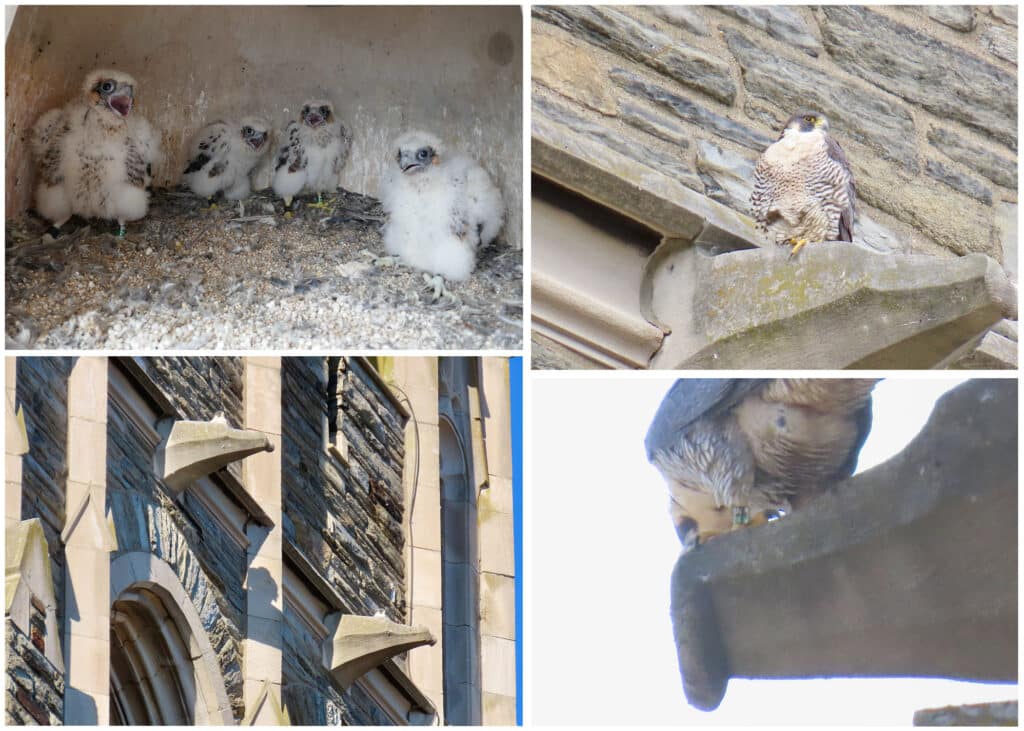
March 26

Who doesn’t love the surprise of a fourth egg? I had a feeling that by saying “it appears that no more eggs will be laid” another would be laid. 😆 Peregrines typically lay 4 and sometimes 5 eggs. The fourth was laid at 2:26:02 PM on March 25. It just took Frida a little more time to develop her last egg (will there be one more?). With that said, incubation is still in full swing.
March 24
It appears that no more eggs will be laid this spring, as the forth egg would have been laid over the weekend. This is not abnormal, as their average clutch size varies from 3-4 (sometimes 5). With incubation underway, this puts hatching to begin towards the tail end of the second full week in April.
Over the next several weeks, we will watch as the pair incubate the eggs where the female does the majority of incubation duties. She will occasionally get breaks to stretch, feed and preen where the male takes over. They will shift/roll eggs to ensure they develop properly several times a day. This prevents the developing embryo from sticking to the shell and ensures even heat distribution.
March 20
Happy Spring! Frida and Mango are now incubating three eggs! The second was laid on March 17 and the third was laid early this morning. Now that they have almost a full clutch of eggs, they will be incubating them more. Their typical incubation period lasts 28 days and the last egg should be laid late tomorrow or early Saturday. This puts hatching close to the beginning of Earth Week. Delaying incubation is a natural adaptation that ensures all eggs hatch around the same time, giving all chicks a better chance of survival. In contrast, ospreys begin incubating immediately after the first egg is laid, resulting in nestlings of varying ages. This strategy addresses prey shortages, where only the oldest nestlings may survive if food is scarce.
March 17
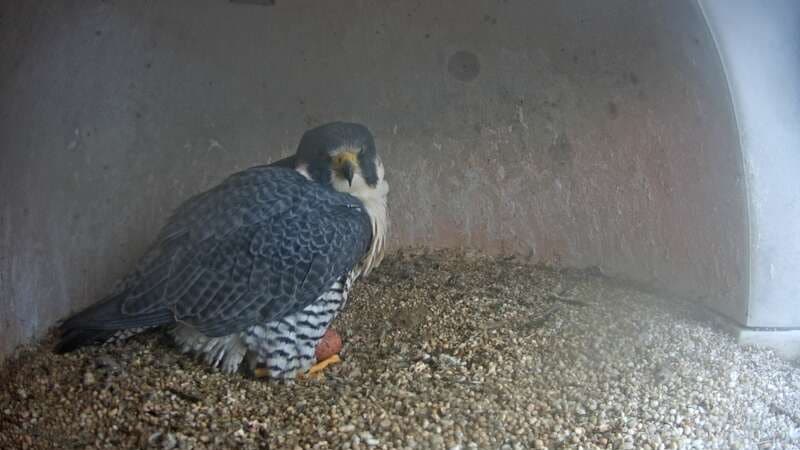
On the morning of March 15 at 6:30am, viewers got their first glance of the first egg. We knew egg laying was close as the pair has been observed copulating, performing eee-chup courtship (bowing) displays on camera. Frida has also been spending more time in the nestbox preparing her scrape, which is a shallow depression in the nestbox where eggs are laid. Peregrines do not build a nest like hawks, eagles and ospreys and instead create a shallow depression in gravel, soil and other debris to nest. This is often the case on ledges of cliffs and in our human dominated landscape, it also includes tall buildings and sometimes flowerpots left unattended on upper floors of apartment building patios. The second egg should be laid sometime over night or tomorrow.
On another note, we decided to wait to remove the worn green carpet for perching. Introducing disturbance to the pair before laying began would not have been good. Instead, we will swap this carpet when we visit the nest for a health check after the young hatch in around 45 days (late April).
Lastly, we opened up chat on two of the live streams on our YouTube channel, so you can watch and talk with other viewers. BW
February 27
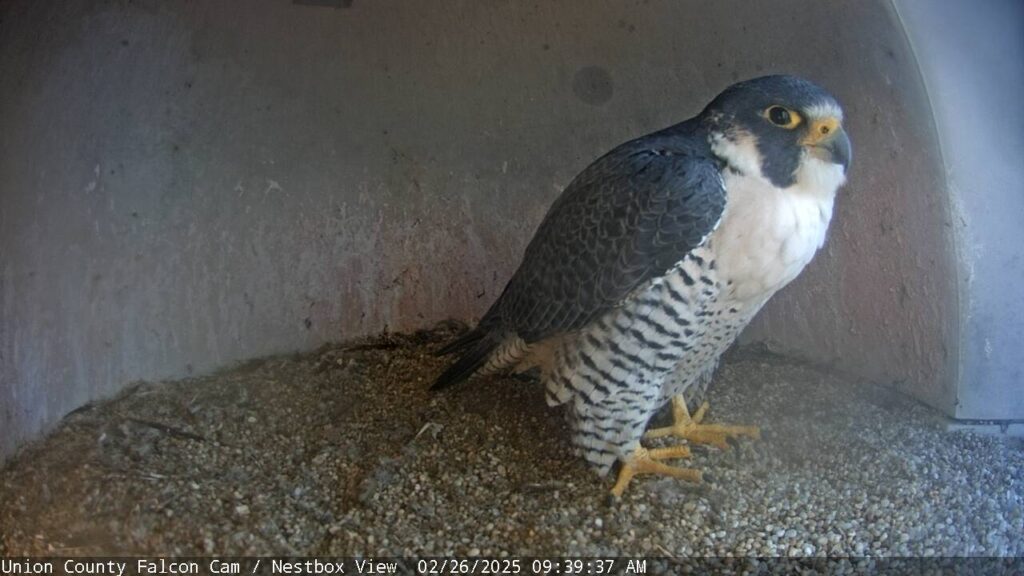
Here we go! Those watching closely have seen the pair more and more lately as they strengthen their pair bond by mating and bowing to each other in the nestbox. Some snapshots were posted below. The third camera (showing the other side of the roof) had some technical issues but was brought back online earlier this week. As this website is new, we have to figure out how to display 1-3 of the live streams on this page, but as you know they are all available on Union County’s website (link above).
Some light maintenance will occur sometime in the next two weeks. The green carpet that is worn will be replaced, prey remains will be cleaned up, and lens covers will be cleaned.
Some seasonal notes. Last year the first egg was laid on March 16. In 2022 + 2023 it was March 19, so who wants to bet that an egg will be laid during the third week of March? I’m betting it will be earlier than last year. Time will tell. Either way, it will be great to focus on wildlife and see some new life after what seemed like a really cold, long and dark winter. BW
Interact, post photos and comments
Conserve Wildlife Foundation is proud to partner with Union County to stream the live view of this falcon nest from the roof of the County Courthouse in downtown Elizabeth, New Jersey.
Union County Falcon Cam Education
CWF’s Soaring with STEM program educates children about New Jersey’s unique natural resources and the rare wildlife that shares our environment using the Union County Falcon Cam as the primary technological learning tool. Through interactive and engaging classroom and assembly presentations, our experienced educators bring wildlife into your school. Students are fascinated to discover that these raptors nest and raise young each year right in their own backyards! Teachers receive structured lessons and interactive activities to address the Next Generation Science Standards for grades 3-5. Learning about their wildlife neighbors helps children to connect to their community and teaches children to consider how their everyday actions impact the natural world around them.
A special thanks to Phillips 66 for their sponsorship of the Union County Educational programs utilizing the Union County Falcon Cam.
Sponsors + Partners


